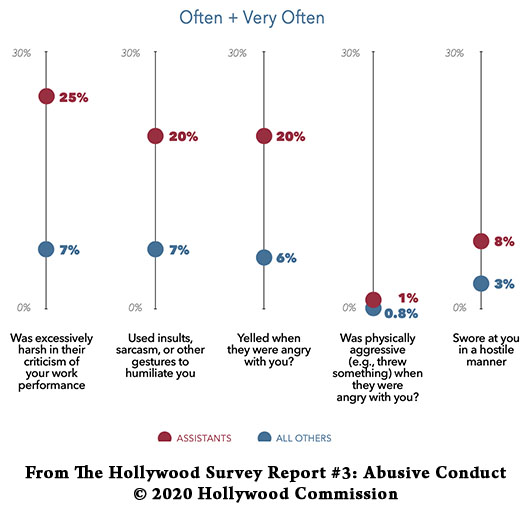The Hollywood Commission, chaired by Dr. Anita Hill (pictured above) released the third report from its landmark, industry-wide worker survey. The topic is abusive conduct/workplace bullying in the entertainment industry.
In Dec. 2017, led by Chair Anita Hill [University Professor at Brandeis University, Counsel to Cohen, Milstein, Sellers & Toll, a plaintiff’s law firm] and then Executive Director, Trista Schroeder, the Hollywood Commission convened a powerful group of 26 major organizations in Hollywood including studios, television networks, streaming services, music companies, talent agencies, trade associations, and unions. All agreed that to change a culture that allows for abuses of power such as sexual harassment and bias, industry-wide support and adoption of a shared set of best practices and principles will be required.
Hollywood Commission founders are Kathleen Kennedy, President of Lucasfilm, Nina Shaw, partner of prominent entertainment law firm, and Freida Kapor Klein, activist and pioneer in organizational culture and diversity.
Definition of Abusive Conduct
During the past 12 months how often have you been in a situation where someone from work or related to work [never to very often]:
1. Was excessively harsh in their criticism of your work performance?
2. Used insults, sarcasm, or other gestures to humiliate you?
3. Yelled when they were angry with you?
4. Was physically aggressive (e.g., threw something) when they were angry with you?
5. Swore at you in a hostile manner?
The sample: 9,630 respondents primarily working in television and film: 57% Female, 82% White
Gender: Women twice as likely to say they were bullied.
Percentages stating the bullying was often or very often
1. excessively harsh in their criticism: 11% (W) 5% (M)
2. insults to humiliate: 10% (W) 5% (M)
3. yelled when angry: 9% (W) 5% (M)
4. physically aggressive when angry: 1% (W) 0.6% (M)
5. swore at you: 4% (W) 3% (M)
Age: Reporting percentages decreased with age, i.e. younger workers (18-29) were most likely to report every form of bullying.
Rank: someone who could influence their ability to get a job (55%), ability to keep a job (68%), or reputation in the industry (64%).
The Special Case of Hollywood Assistants
73% female working assistants in production, for executives, in writer’s room, or personal and composer’s assistants
For assistants, their bully was a person who could
influence their ability to get a job (77%), to keep a job (81%), and could influence reputation in the industry (78%)
Assistants reported abusive conduct at double the rate of the other respondents in each of the categories.

Critics of the MeToo movement (mainly men) whine that it was started in the entertainment industry and sexual harassment denial is a deplorable aspect of that particular industry. Balderdash! Every woman knows the denial is undertaken by every employer in every workplace.
Bullying, abusive conduct, is not confined to any type of workplace and is 3 to 4 times more prevalent than sexual harassment. Its denial is part of every manager and executive playbook. WBI has demonstrated through its national surveys the prevalence juxtaposed with American employer inaction. Since we have yet to have a mainland state legislature enact the full Healthy Workplace Bill, due to disproportionate influence of the business lobby over lawmakers in every state, bullying runs unchecked.
This Hollywood Commission survey report closely parallels the WBI national survey findings: women are the primary targets of bullying, perpetrators are bosses, and the lowest ranking individuals suffer the most. Alas, bullying is not uniquely found in Hollywood.


